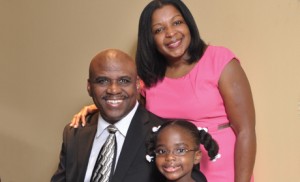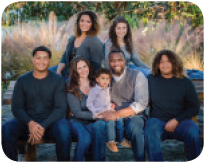Stroke of Genius
Two Central Florida Dads Survive & Thrive After Stroke
A stroke occurs when a blood vessel feeding the brain either gets clogged or ruptures. This blood and oxygen interruption impairs the brain and its bodily functions – either temporarily or permanently. Stroke is the fifth leading cause of death and the leading cause of disability in the U.S., even though most stroke incidents can be prevented through proper lifestyle choices. Stroke can happen to anyone, including children and babies in utero, though age, heredity, race, and gender increase risk. The most common symptoms include severe headache, slurred speech, numbness/weakness (especially on one side), confusion, dizziness, or blurred vision. Two local dads who each survived a stroke say that their brain attack turned out to be a stroke of genius. In their own words, Lennox Flynn and Ray Forsythe share how a new perspective on life was a no-brainer!

Lennox Flynn – In April 2007, two days after I married my wife Paula, I suffered a major stroke, resulting in slurred speech and paralysis on the right side of my body. Paula was three months pregnant at the time and her health should have been the focus. But, instead, I was hospitalized for two weeks, followed by a slow recovery.
To a musician with over 25 years of experience, the thought of never playing the organ or piano again was devastating! But the pending birth of our daughter served as great motivation to recover, including reclaiming my musical abilities. I practiced diligently and even though I missed most keys, I began to make progress. According to the American Stroke Association, music therapy can help improve balance, gait, speech, memory function, attention, and focus. Think about how music can challenge the brain to plan a task, perform the function, remember notes, and so on.
Six months after my stroke, our beautiful daughter Leah was born. As a result of my stroke, I was no longer able to work and transitioned into the role of stay-at-home dad – a wonderful blessing, as I would later learn. I continued to play (and rehabilitate) and, when
Leah was about three years old, I introduced her to the piano that she so often heard. To my surprise, she quickly picked it up! Just a few years later, she learned to play the violin at an exhilarated pace and proved to be quite the prodigy.
Leah, now 8-years-old, loves to perform and uses her talents to bring people together and inspire change. For example, after witnessing televised riots following a shooting in Ferguson, Missouri, Leah volunteered to play her violin on the news to help bring peace. The kind and sincere gesture of this child inspired many.
Now I realize that my stroke was not a death sentence but, rather, a challenging stroke of genius that granted a lively bond between my daughter and me. Music has inspired Leah and, in turn, Leah inspires me – every day.
Ray Forsythe – It seemed to be a typical February morning. My son Hawke and I were greeted with a smile and handed paperwork at his scheduled eye examination, but I noticed that my right arm would not grab the clipboard. I

asked Hawke to complete the forms so my daughter, Grace, could accompany me to the car to rest. Lying in the front seat, my tongue felt heavy with an unusual facial feeling. Grace called my wife Doreen, a registered nurse, and she
thankfully recognized that I was having a stroke.
I was in disbelief. This couldn’t be happening to me… a retired professional athlete for the NFL Cincinnati Bengals. At just 42, I was at the top of my professional business career and an All-American dad to Brynn (24), Stone (17), Hawke (15), Grace (14), and Jaxon (2), with one on the way! But it was happening… a hemorrhagic stroke in my central brain stem, resulting in significant impact to mobility on my right side, speech, memory, and ability to swallow. One thing that I didn’t lose, however, was my desire to live life to the fullest and not be sidelined from my family. Hearing the grim expectations that “I would not recover the use of my arm and would only have minimal use of my leg” was my prescription to get back into the game – as the father and husband that I needed to be – despite my fierce opponent (the stroke).
So I approached rehab like football training camp. But it was much harder (and a lot less fun). I pled with my coaches (therapists) for extra drills to better train my body. After two months, I set short-term goals to reclaim normalcy, with victories to include the ability to run a football field and walk alongside a pool to support my kids in their sports. On the day of my rehab discharge, I got out of my wheelchair and walked out of the front door! This victory happened just in time for another victory – the birth of our sixth child, Harrison Brooks.
A year later, I continue to approach rehab like training camp; quitting will never be a part of my game plan. However, my goals have changed slightly. I now long for the simple moments of holding my baby boy and handling diaper duty. And, as Sto
ne follows my footsteps, I want to walk into his collegiate football stadium to cheer him on. Thankfully, my family continues to cheer me on.
Act FAST!
Call 9-1-1 if you recognize a stroke.
Face: Is the face displaying signs of numbness? Ask the person to smile and note if mouth or eyes droop.
Arms: Are limbs weak? Ask the person to hold both arms straight out. Does one drift downward?
Speech: Has verbal communication, such as speech and/or understanding, become difficult? Ask the person to recite a simple sentence without slurring.
Time: If you observe warning signs in yourself or another, call 9-1-1 immediately. Lean more at StrokeAssociation.org






